More on infixation and code-mixing in Cantonese
« previous post | next post »
My note yesterday about Cantonese infixation into English words was written while changing planes on the way back from Hong Kong, and was somewhat rushed, not to say incoherent. Thanks to the commenters who helped clear things up! This morning, I'd like to add a few more references and observations about several interesting aspects of this phenomenon and its context.
To start with, Cantonese speakers often mingle English words or short phrases freely into colloquial Cantonese. Researchers at CUHK told me (if I recall correctly) that in their collection, about 20% of Cantonese phrases included a bit of English, most often one word. Because of the relatively fine granularity of the combination of languages, people who study this phenomenon in Hong Kong seem to prefer the term "code mixing" to the more widely used term "code switching", which stereotypically refers to switching back and forth between languages at the level of somewhat larger syntactic units.
Sometimes this represents simple borrowing of English words into Cantonese — but as usual in such cases, there's a spectrum of phenomena between out-and-out borrowing and switching between languages. For some discussion, see Kang-Kwong Luke "Why two languages might be better than one: Motivations of language mixing in Hong Kong", in Martha Pennington, Ed., Language in Hong Kong at Century's End, 1998; David C.S. Li, "Cantonese-English code-switching research in Hong Kong", World Englishes 19(3) 2000; Joyce Y.C. Chan et al., "Development of a Cantonese-English Code-Mixing Speech Corpus", InterSpeech 2005; and many other references.
The infixation examples noted yesterday are an especially interesting case of "code mixing". A larger set of examples can be found in Matthews & Yip, Cantonese: A Comprehensive Grammar, 1994, who write that
In colloquial Cantonese certain words may be infixed inside a morpheme (stem). The expletive gwái 'devil, ghost', used to emphasize adjectives (9.1.2), may be infixed not only single morphemes but also morpheme boundaries, compound words and phrases:
They give these examples:
They observe that "Other expletive words, many more offensive than the relatively mild gwái, may be infixed similarly". It's also clear that the syntax as well as morphology of this phenomenon deserves some attention:
Gwái is very versatile and may be used in many other contexts such as questions for rhetorical effects:
They even give some examples of recursive infixation:
Alan Yu, A Natural History of Infixation, OUP 2007, points out that the phonology of this infixation process exhibits some interesting variation:
The exact distribution of this infix is complicated by the fact that it might also interact with foot structure. Some quadrisyllabic words show variation in the distribution of the infix; the infix may appear after the first syllable or after the first disyllabic string (139)c. One interpretation of this variation is that the infix wants to be after the first prosodic constituent of a string. Assuming that quadrisyllabic words are analyzed as consisting of two disyllabic feet, the wh-word may appear after the first foot or the first syllable. Thus, while it is difficult to substantiate the need for a first-syllable pivot on the strength of one set of evidence, the Cantonese evidence nonetheless provides a strong case for such a pivot. Future research might turn up more supporting evidence for this pivot.
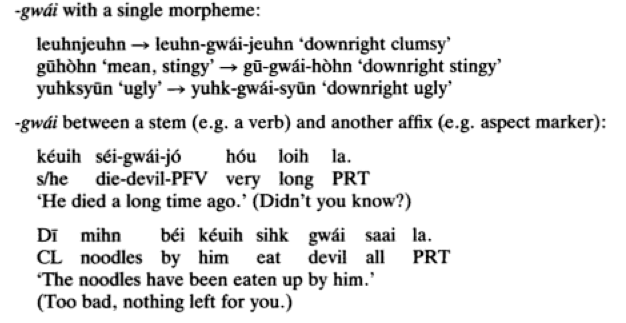
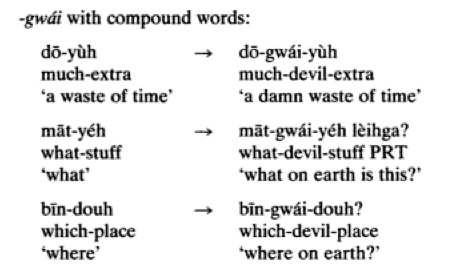
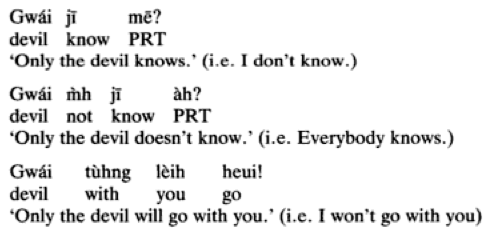
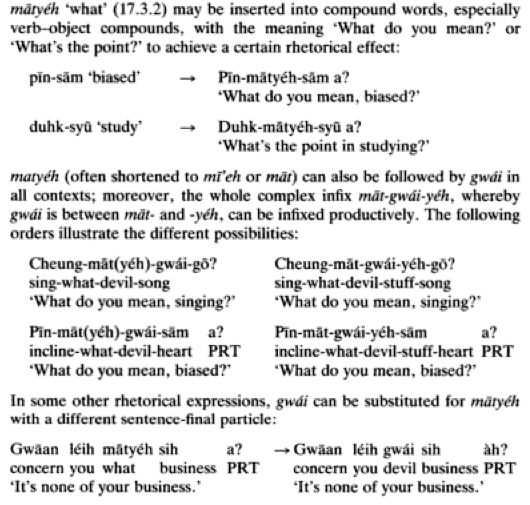
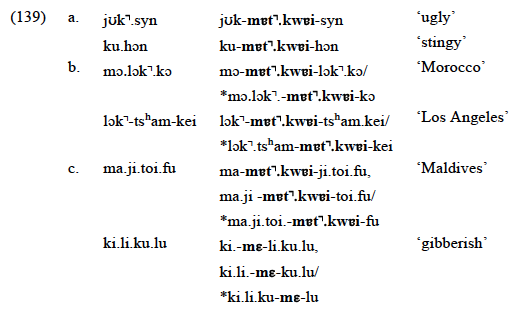
Twitter Trackbacks for Language Log » More on infixation and code-mixing in Cantonese [upenn.edu] on Topsy.com said,
October 6, 2010 @ 6:55 am
[…] Language Log » More on infixation and code-mixing in Cantonese languagelog.ldc.upenn.edu/nll/?p=2687 – view page – cached My note yesterday about Cantonese infixation into English words was written while changing planes on the way back from Hong Kong, and was somewhat rushed, not to say incoherent. Thanks to the commenters who helped clear things up. This morning, I'd like to add a few more references and observations about several interesting aspects of this phenomenon and its Tweets about this link […]
Spell Me Jeff said,
October 6, 2010 @ 10:02 am
Pity the reader who joins this discussion in medias fucking res.
James C. said,
October 6, 2010 @ 11:14 am
Is this really infixation or is it actually tmesis, like the -fucking- case in English? The distinction between the two is rather fine, and it seems like many (most?) linguists nowadays think of tmesis as a subset of infixation rather than a distinct phenomenon.
John Cowan said,
October 6, 2010 @ 1:21 pm
James C.: Fucking A it's in-fucking-fixation.
Matt said,
October 6, 2010 @ 1:57 pm
It's been a long time since I've had any Cantonese, and I've never studied it formally, so my memory may be hazy and my transcription likely wrong, but I remember making this particular error when trying to emphasize the adjective "hou mei" (delicious)
I was told that my first attempt "hou lan mei" meant "tastes like fuck," and was pretty insulting – I was aiming for "hou lan hou mei" (really fucking delicious). Oops (I never got a more detailed explanation as to why that particular infixation was so disastrous).
Ray Dillinger said,
October 6, 2010 @ 1:57 pm
I'm having a difficult time coming up with any other English infixes besides -fucking- . Which is in some ways a relief because infixing would make an already complex phonology more difficult, and in other ways disappointing, because if we were going to use it just once wouldn't it have been nicer to use it in a way that were less an expression of our horrifying cultural tendency to conflate sexuality with obscenity?
groki said,
October 6, 2010 @ 2:43 pm
I can guaran-damn-tee there are other infixes in English.
stormboy said,
October 6, 2010 @ 3:16 pm
Abso-bloody-lutely.
J. W. Brewer said,
October 6, 2010 @ 3:48 pm
Ray D.: Outside AmE there's of course http://en.wikipedia.org/wiki/Bloody (giving AustE example "fanbloodytastic"). Rival conjectural etymologies, but none of the candidates seem sexual.
marsman said,
October 6, 2010 @ 4:28 pm
@Ray Dilinger: I've always wondered how oaths, profanity, vulgarity, obscenity, sexuality and nudity got so muddled in English, but that one's easy. Latin-derived words (defecate, urinate, copulate) are OK. Germanic-derived words (shit, piss, fuck) are not. I've heard this goes back to the Normans hating the way the Saxons spoke.
sep332 said,
October 6, 2010 @ 4:30 pm
Does "a whole nother story" count as infix? And how does one punctuate that, anyway? :-)
fs said,
October 6, 2010 @ 8:48 pm
CantoneseMY4.png seems to depict nested, rather than recursive, infixation.
[(myl) Well, it's one infixed structure inside another, both created by the same process, even though the infixed words are different. To call this "recursive" is a joke in any case, since it doesn't generalize to multiple levels. (At least I assume that it doesn't.)]
ahkow said,
October 6, 2010 @ 10:24 pm
It's not just Cantonese; Mandarin has the shenme gui 什么鬼 "what ghost" (equivalent to Cantonese matyeh gwai) prefixation.
(1) 唱 什么鬼 歌,比 什么鬼 赛 sing shenme gui song, compete shenme gui competition
(blog.sina.com.cn/s/blog_4767a42b0100m6k8.htm)
I think it's prefixation, not infixation, because shenme gui can precede a pretty complicated noun phrase.
(2) 讀 什麼鬼 經濟系 study shenme gui economics
(http://www.mobile01.com/topicdetail.php?f=37&t=1742493&p=7)
xah lee said,
October 9, 2010 @ 6:53 am
the case i think is natural, happens in madarin all the time and usually not needing the “ghost/devil” part. Thinking about it, it happens in english sometimes too.
for example, when somenoe is late, and his excuse was that he's fixing his car. You might get angry and say “fix WHAT car?” or “fix WHAT (goddamn) car?”.
in chinese grammar, the “verb WHAT thing” is a normal way of turning the “verb thing” into question.
so, for chinese who speak both chinese and english or some english words, it's common to split the english into 2 words, such as “so—WHAT-ry?”, usually with a added word to indicate a question, such as “ah?”, as in: “so—WHAT—ry, ah?” (so—什么—ry 吖?) like, “you sor-WHAT-ry eh?”, “you did apolo—WHAT—gize hum?”. The spliting up of english word without considering english grammar adds a comical effect, which is part of the reason these phrase are used, in usually semi-annoyed situation.